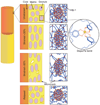Iron-clad fibers: a metal-based biological strategy for hard flexible coatings
- PMID: 20203014
- PMCID: PMC3087814
- DOI: 10.1126/science.1181044
Iron-clad fibers: a metal-based biological strategy for hard flexible coatings
Abstract
The extensible byssal threads of marine mussels are shielded from abrasion in wave-swept habitats by an outer cuticle that is largely proteinaceous and approximately fivefold harder than the thread core. Threads from several species exhibit granular cuticles containing a protein that is rich in the catecholic amino acid 3,4-dihydroxyphenylalanine (dopa) as well as inorganic ions, notably Fe3+. Granular cuticles exhibit a remarkable combination of high hardness and high extensibility. We explored byssus cuticle chemistry by means of in situ resonance Raman spectroscopy and demonstrated that the cuticle is a polymeric scaffold stabilized by catecholato-iron chelate complexes having an unusual clustered distribution. Consistent with byssal cuticle chemistry and mechanics, we present a model in which dense cross-linking in the granules provides hardness, whereas the less cross-linked matrix provides extensibility.
Figures




Comment in
-
Materials science. Holding on by a hard-shell thread.Science. 2010 Apr 9;328(5975):180-1. doi: 10.1126/science.1187598. Science. 2010. PMID: 20378805 No abstract available.
References
Publication types
MeSH terms
Substances
Grants and funding
LinkOut - more resources
Full Text Sources
Other Literature Sources

